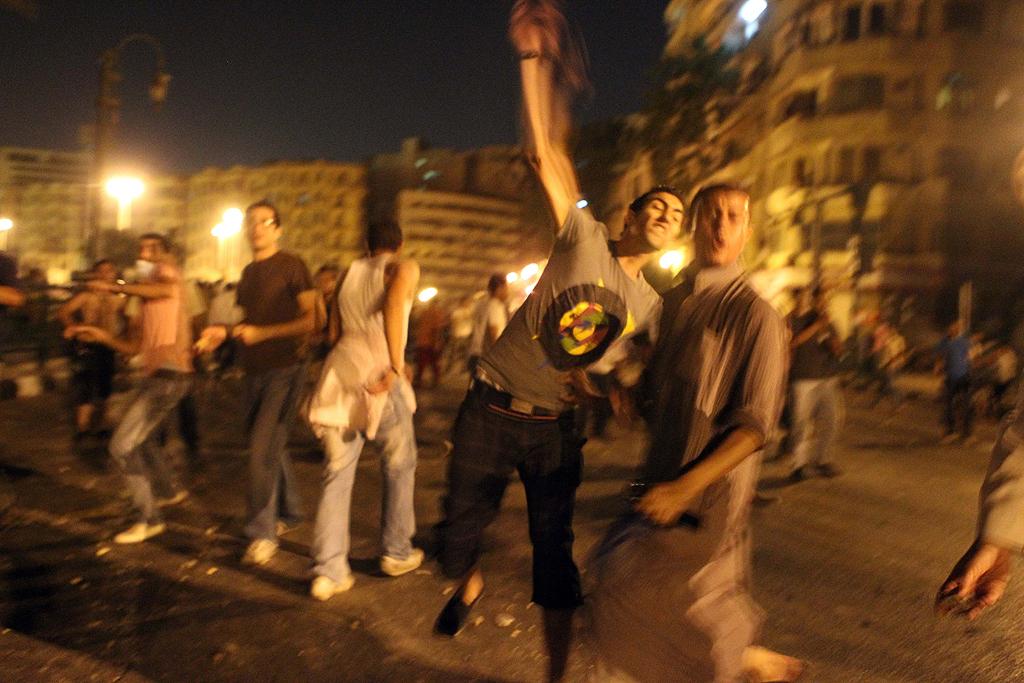Egypt: Dozens injured in latest Cairo clashes
Egyptian protesters throw stones at riot police during clashes in Tahrir square in Cairo in the early hours of June 29, 2011. Egyptian security forces fired tear gas on protesters in Cairo during violent clashes that erupted and left hundreds injured, according to state media.
Dozens of people were injured after clashes erupted between protesters and Egyptian police forces in downtown Cairo late on Tuesday night, according to the state-run Al-Ahram newspaper.
Egyptian security used rubber bullets and teargas to disperse hundreds of demonstrators who had gathered near Cairo's Tahrir Square – the epicenter of the nation's uprising against ex-president Hosni Mubarak earlier this year.
Despite the successive volleys of teargas canisters fired into the crowds, hundreds of protesters continued their sit-in throughout the night and into Wednesday.
Much of the violence reportedly took place in the downtown area near Tahrir Square and the country's interior ministry, the fortress-like Cairo headquarters of Egypt's vast internal security forces.
GlobalPost's Charles Sennott reported from Tahrir Square well into the early hours on Wednesday morning. Read his take on the protest here.
The latest round of unrest in Cairo comes exactly five months after Egypt's bloody "day of rage" in January, when thousands of young pro-reform activists first stormed into the capital's city center, pushing back throngs of bewildered police forces with the type of sheer people power that eventually forced Mubarak's ouster.
So why on earth, months after toppling their former autocratic leader, are Egyptians still protesting?
Simply put, many Egyptians do not believe that the stated goals of their revolution – greater political reform, transparency in government, and an end to abuse of power – have been accomplished yet.
Daily News Egypt reports on the incident that sparked Tuesday's violence:
According to eyewitnesses the clashes started earlier on Tuesday when police tried to clear a sit-in at the state-TV building, which included families of the martyrs of the Jan. 25 revolution.
Later in the day, a memorial service planned for the families ended in clashes. The ministry of interior said in a statement on Tuesday that “people who claimed to be families of martyrs … tried to break into the theater” in which the service was held.
Eyewitnesses said police showed up and attacked the families outside the Balloon Theater in Agouza.
An Egyptian activist/blogger who was at the scene in Agouza, a Cairo district on the Giza bank of the Nile River, wrote that clashes broke out almost immediately after the police arrived at the memorial service. Security forces used electric tasers to disperse the crowd, she added.
Many Egyptians question the pace of reform taking place inside the country's once-feared police forces, which disbanded after becoming the prime target of public anger in January.
"None of us want this confrontation, but we will be damned if we allow them to take us back to the Mubarak days," wrote one Egyptian blogger on Twitter, in an apparent reference to the police.
And as the Associated Press reports, many in the country are still anxious to see justice served in the cases for the nearly 850 people who were killed during the uprising, many from police gunfire.
Mubarak is due to face trial in early August, charged with ordering his policemen to open fire on protesters during the uprising. Not everyone, however, is optimistic about the timing of his early Ramadan court case.
Egypt's government blamed "organized elements" for Tuesday night's violence.
Several members of Egypt's military-led interim government, which has been in power since Mubarak stepped down on February 11, said on Wednesday that the violence was the result of a counter-revolutionary group seeking to incite chaos in the country, according to local reports (see here and here).
